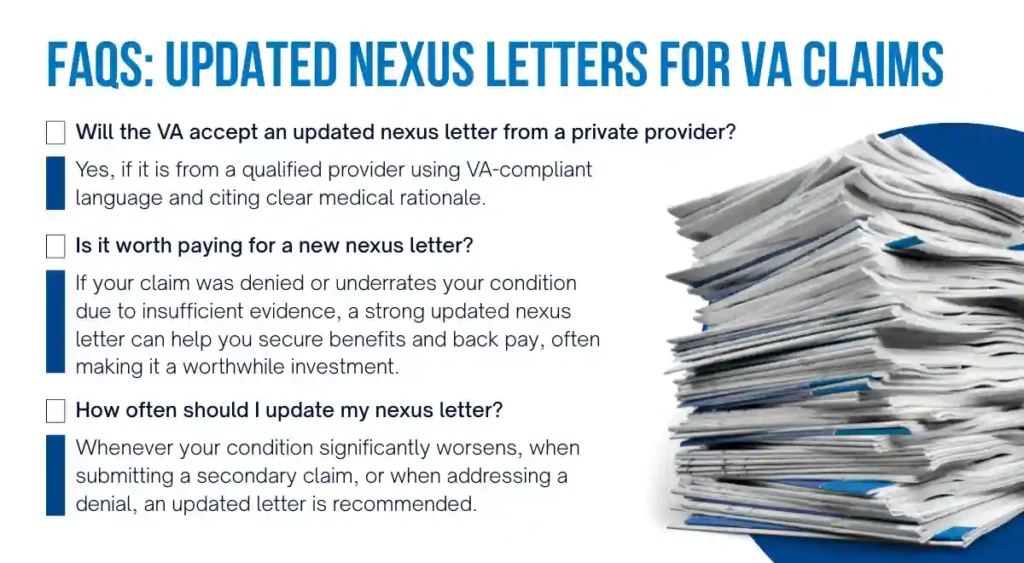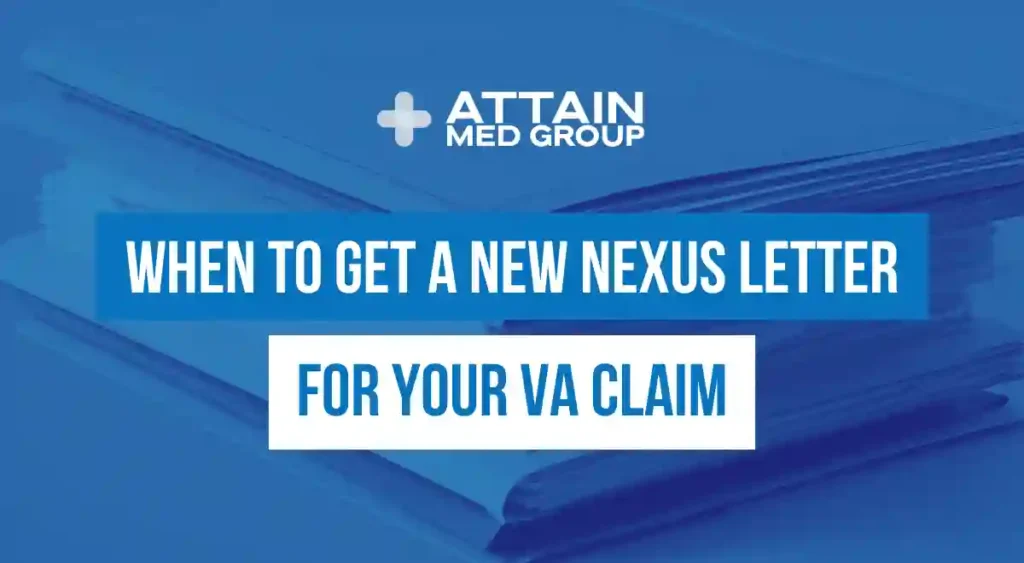A nexus letter bridges your current diagnosis to your service or a service-connected condition, using medical rationale the VA recognizes. However, many veterans don’t realize that an outdated or vague nexus letter can stall, underrate, or even deny your claim.
If your case has new evidence, worsened symptoms, or previous denials, an updated nexus letter for your VA claim may be the key to winning benefits and back pay you deserve.

What Is a Nexus Letter, and Why Is It Crucial?
A nexus letter is a medical opinion from an independent, qualified provider stating that your condition is “at least as likely as not” connected to your service or to another service-connected condition (secondary claim).
It:
✅ Bridges Gaps in Your Medical and Service Records
Many veterans do not have clear documentation linking their condition directly to a specific in-service event, especially if symptoms developed later or were not treated during service. A nexus letter can explain how your current medical condition relates to your service, even if your records do not explicitly document it.
✅ Uses VA-Compliant Legal Language
A good nexus letter uses specific language the VA looks for, including:
- “At least as likely as not” (50% or greater probability).
- “More likely than not” (greater than 50% probability).
- “Due to” or “caused by” service.
This ensures your evidence is clear and recognized within VA decision-making frameworks.
✅ Cites Credible Medical Rationale and Research
A strong nexus letter doesn’t just state an opinion; it explains why your condition is linked to your service, referencing:
- Known medical pathways (e.g., how PTSD hyperarousal can lead to sleep apnea).
- Peer-reviewed research studies.
- Your specific service-related exposures or activities (e.g., repetitive lifting, combat-related stress).
This medical rationale makes your claim medically and legally persuasive.
✅ Increases Your Claim’s Approval Chances and Fair Rating
Because many claims are denied for “no nexus,” a well-crafted nexus letter can prevent denials, reduce delays, and strengthen your appeal if your claim was previously denied. It helps ensure your condition is properly rated for severity, potentially increasing your monthly compensation and back pay.
Without a strong, up-to-date nexus letter, your claim may be denied for “no nexus.”

When Should You Consider Getting a New Nexus Letter? (title)
1️⃣ After a VA Denial for “No Nexus” or “Insufficient Evidence”
If your VA denial letter states that your claim lacks medical evidence of a connection, it may be time for a stronger, clearer nexus letter. An updated letter can address VA feedback, clarify the medical connection, and strengthen your appeal.
2️⃣ If Your Condition Has Worsened Since Your Last Nexus Letter
If your symptoms have progressed, your nexus letter may no longer accurately reflect your current condition or limitations. A new letter can document:
- Worsening pain, frequency, or severity of symptoms.
- Additional functional limitations or impacts on daily life.
- The progression of your condition related to your service.
3️⃣ When Submitting a Secondary Service Connection Claim
If you are filing for secondary conditions (e.g., sleep apnea secondary to PTSD, radiculopathy secondary to back pain), you will need a nexus letter specifically addressing the causal or aggravation relationship between your primary condition and your new condition.
4️⃣ Before a Board of Veterans’ Appeals (BVA) Hearing
If your case is advancing to the BVA level, an updated nexus letter with clear, cited medical rationale can significantly strengthen your evidence and support your case during the hearing.
5️⃣ If There Is New Medical Research Supporting Your Claim
Sometimes, new peer-reviewed studies or VA guidance support medical links between your condition and your service. An updated nexus letter can cite these studies, aligning your claim with the latest recognized medical pathways.
6️⃣ When the Original Letter Lacks VA-Compliant Language or Detail
Not all nexus letters are created equal. If your original letter:
- Does not use “at least as likely as not” wording,
- Fails to cite medical rationale or research,
- Does not reference your medical and service records, it is worth investing in a new, VA-compliant nexus letter to strengthen your evidence.

How an Updated Nexus Letter Can Strengthen Your VA Claim
An updated nexus letter can:
✅ Address VA feedback in a prior denial.
✅ Include updated medical records, labs, and symptom progression.
✅ Clarify complex secondary or aggravation claims.
✅ Use precise, compliant language the VA understands.
✅ Reference new research supporting your claim.
These improvements can prevent unnecessary appeals, reduce delays, and increase your chances of approval and back pay.
How to Get an Updated Nexus Letter That the VA Will Recognize (title)
Step 1: Review Your Current Claim and VA Decision Letters
Identify the reason for denial or the need for clarification (e.g., lack of medical connection, vague medical opinion, or missing progression documentation).
Step 2: Gather Updated Medical Evidence
Collect:
✅ Current treatment records.
✅ Diagnostic studies (imaging, labs).
✅ Medication changes.
✅ Symptom diaries documenting flare-ups, limitations, and progression.
Step 3: Research Relevant Medical Studies
Gather credible, peer-reviewed studies that support your claim (e.g., studies linking PTSD and sleep apnea, or chronic pain and depression).
Step 4: Contact an Independent Medical Provider
Choose an expert who:
✅ Has experience writing VA-compliant nexus letters.
✅ Uses legal terminology recognized by the VA.
✅ Reviews your complete medical and service history to craft a thorough letter.
Step 5: Ensure the Letter Includes:
✅ Your full diagnosis and current status.
✅ Reference to your medical and service records.
✅ VA-compliant “at least as likely as not” language.
✅ Detailed medical rationale with cited research supporting the connection.


Is It Time for an Updated Nexus Letter?
If your VA claim has stalled, was denied for “no nexus,” or your condition has worsened, an updated nexus letter can be the game-changing evidence you need.
Attain Med Group specializes in high-quality, VA-compliant nexus letters backed by credible medical evidence to help veterans like you secure the benefits you deserve.

Take the Next Step Today
✅ Ready to strengthen your VA claim?
Contact Attain Med Group to book a consultation for an updated nexus letter.
✅ Download our free guide: “When and Why to Update Your Nexus Letter” to prepare your evidence.
✅ Don’t let missing or outdated medical evidence stand between you and the benefits you’ve earned.

